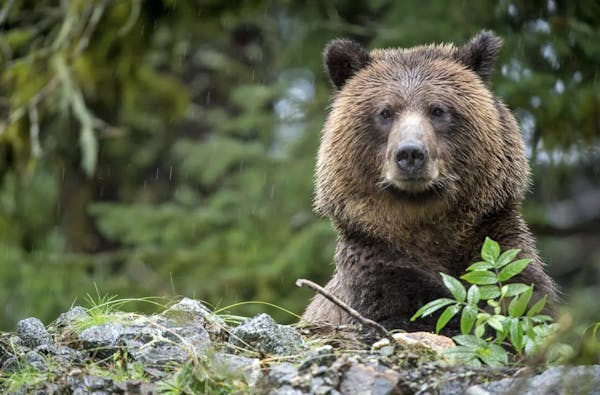How Dr. Rae Wynn-Grant bridges science, storytelling, and social justice
- Nature Conservation
- Land Conservation
- Climate Heroes
- Women
- Social Justice
- Biodiversity
- Education & Awareness
- Wildlife
- Mammals
- North Pacific
- Northern America Realm
Each week, One Earth is proud to feature a Climate Hero from around the globe, working to create a world where humanity and nature can thrive together.
Dr. Rae Wynn-Grant is redefining what it means to be a conservationist in the 21st century. As a large carnivore ecologist, storyteller, and advocate for diversity in science, her work connects wildlife conservation with the urgent need for social equity.
Through her groundbreaking research, compelling communication, and unwavering commitment to justice, she is forging a path where saving ecosystems and empowering communities go hand in hand.
Inspired indoors, driven outdoors
Dr. Rae Wynn-Grant’s journey into wildlife ecology began far from the savannas of Kenya or the forests of Montana. Raised in urban California, her love for the natural world started in unconventional ways. In her talk at the 2024 Bioneers Conference, she shared about her childhood, “Ironically, the place where I really became super passionate about nature was indoors. It was by watching TV.”
Nature shows introduced her to the wonders of wildlife, sparking a lifelong ambition to work in conservation science. Her passion for wildlife propelled her through Emory University, Yale, and Columbia, culminating in a Ph.D. in Ecology and Evolution.
Becoming a voice for wildlife and people
While Dr. Wynn-Grant’s scientific research focuses on large carnivores, including black bears and African lions, she is equally committed to addressing the intersections of environmental and social justice. Reflecting on her fieldwork in Kenya during Hurricane Katrina, she recalls Maasai villagers asking, “Why are you here? You're all the way across oceans and continents studying our wildlife, but it looks like your people and your community at home really need some help.” That question shaped her career, merging conservation science with the needs of marginalized communities.
Her work involves high-level statistical modeling to map human-wildlife conflicts, such as predicting black bear encounters near human developments. But Dr. Wynn-Grant emphasizes, “We must understand that saving ecosystems also means addressing the systemic inequities that keep many from participating in conservation.”

Fieldwork in action: Dr. Wynn-Grant uses advanced tracking technology to study large carnivores and their habitats, offering insights into coexistence strategies. Image Credit: RaeWynnGrant.com.
Science communication as a path to justice
Dr. Wynn-Grant’s commitment to inclusivity in science extends beyond her research. Through PBS’s award-winning podcast Going Wild with Dr. Rae Wynn-Grant and Mutual of Omaha’s Wild Kingdom, she shares the resilience of nature and the urgent need for conservation.
“Animals and ecosystems have a lot to teach us about mutual respect and the importance of caring for one another in mutually beneficial ways."
Her science communication isn’t just about education; it’s about representation. As a Black woman in a predominantly white field, she actively advocates for women and people of color in STEM. In her own words, “We have to have social justice at a minimum as a foundation for environmental solutions. Otherwise, we only have the most privileged people working on these solutions, and it's too slow.”
How a single bear can teach us about ecosystem health
Dr. Wynn-Grant’s field stories highlight the delicate balance between human actions and wildlife survival. While studying bears in the Lake Tahoe Basin, she discovered a young bear that had died after consuming aluminum ketchup packets from a dumpster. That one bear’s suffering, for her, symbolized the broader challenges within the ecosystem. It was a wake-up call to address human impact on wildlife.
Her research underscores the need for proactive solutions—like securing waste and protecting wildlife corridors—to foster coexistence between humans and large carnivores.

Dr. Rae Wynn-Grant holds a bear skull, pointing to the bullet hole that ended its life. Preparing for an ecology talk, she reflected on the parallels between the mortality risks faced by black bears in the wild and Black men in America, highlighting the intersection of social justice and conservation. Image Credit: Bioneers.
Integrating equity into the fight against climate change
Dr. Wynn-Grant’s approach to conservation science—integrating data-driven research, community engagement, and advocacy—directly addresses the dual crises of climate change and biodiversity loss. By studying how human actions affect large carnivores and advocating for systemic equity, she contributes to creating healthier ecosystems and more inclusive conservation efforts.
“I get to spend a lot of time in nature, and its resilience is remarkable,” she says. Her work not only helps wildlife survive, but also empowers communities to take charge of conservation, making it a collective solution for a sustainable future.
Explore More Climate HeroesYou might also like
-

The grizzly bear: Surprisingly, the world's most flexible large mammal
Explore the challenges and significance of grizzly bears, focusing on their role as apex predators, cultural icons, and subjects of conservation efforts in North America.
-

Weaving Indigenous and Western science: Robin Wall Kimmerer’s vision for healing our relationship with nature
Robin Wall Kimmerer inspires hope by blending Indigenous and Western science to solve the problems of our time: climate change, biodiversity loss, and eco-anxiety, emphasizing reciprocity and kinship.



